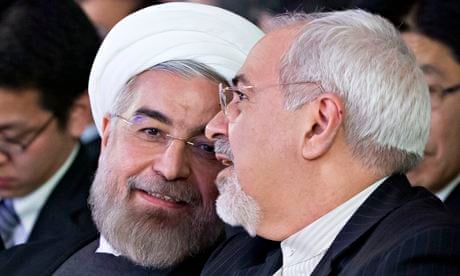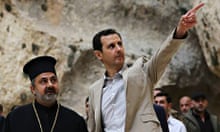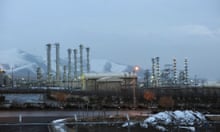The Iranian president, Hassan Rouhani, is facing growing criticism from a broad array of political hardliners and rightwing opponents who say his government is being duped by the US in an over-hasty attempt to clinch a nuclear deal with the west and end economic sanctions.
At a meeting at the former American embassy building in central Tehran on Saturday, a newly formed group of MPs and rightwing activists calling itself "We're Worried" claimed Iran's negotiating team was ignoring national interests in the nuclear talks, which resume on 13 May in Vienna.
"The whole nation believes the main intention of the United States is to fully halt the Iranian nuclear programme," said Fatemeh Alia, a central committee member of the hardline Islamic Revolution Resistance Front, previously allied to the former president Mahmoud Ahmadinejad.
"Since the beginning of the drafting of the final nuclear agreement with Iran is scheduled for 13 May this year, the analysts, the university students, the elites, and the university professors wish to express their worries to the [Iranian] nuclear negotiators hoping that they would heed such concerns," Alia told the official news agency Irna.
Despite an interim agreement in Geneva last November that granted Tehran limited sanctions relief in return for a slowing of its nuclear programme, no cracks had appeared in the international sanctions regime, Alia said. Meanwhile the US had made additional demands concerning human rights and Iran's missile stockpile. Alia said the Rouhani government should stop treating its critics as "illiterates".
Esmaˈeil Kowsari, another MP, said the whole nation wanted an end to the nuclear standoff with the west, but the cost could be too high. "The main point in these negotiations is maintaining the balance in implementation of both sides' commitments, which needs to be observed while preserving the interests and rights of the Iranian nation," Kowsari said. The world powers had not shown the same "honesty" as Iran in abiding by their commitments, he said.
Pressure on Rouhani has been building in recent weeks as the likelihood of a deal has grown. Ayatollah Ali Khamenei, Iran's supreme leader and a staunch religious conservative, has backed the president's negotiation policy but made clear that certain red lines cannot be crossed. To appease rightwingers, he has ordered a review of the negotiators' performance.
"I agreed to the government's initiative to negotiate, just to break the hype," Khamenei said in a speech last month marking national nuclear technology day. But Iran would continue to resist the designs of the "Global Arrogance", he said, referring to the US. "The activities of the Islamic Republic in the area of nuclear research and development will not stop in any way. None of the nuclear achievements of the country can be given up,", Khamenei said.
As a fallback, Khamenei continues to argue that sanctions can be rendered ineffective by increased economic self-sufficiency and by attracting investment from non-western partners such as China.
The US and Britain have expressed guarded confidence that a final nuclear deal with Iran can be reached by the deadline of 20 July, describing the talks as "very substantive".
Rouhani and his chief negotiator, Mohammad Javad Zarif, have echoed those sentiments. "Iran is optimistic about the results of the talks and has taken great steps to reach a comprehensive deal and aims to achieve a win-win result," Rouhani told Iranian television last week.
Rouhani hit back angrily at his critics. "Through lies and hype some people are trying to derail the government from its path, and this is against national interests and the leader's order … Iran does not compromise on the people's interests," he said.
Part of the pressure on Rouhani stems not from public concern about the nitty-gritty of the nuclear deal but from entrenched partisan opposition to his new centrist government, which took office last year after defeating the conservative and rightwing principlist factions that dominated political life during the Ahmadinejad years.
Rouhani's main electoral pledge was to improve the economy. The lifting of sanctions is key to that objective, and has become more critical in the past nine months as economic conditions have deteriorated for most Iranians.
The rightwing opposition, which believes Rouhani is tainted by reformist ideas, claims his policy is failing, while popular support appears to be dropping.
Amir Mohebbian, an influential rightwing writer, government insider and founder of the traditionalist Modern Thinkers party, said the conservative opposition believed Rouhani had "accepted the ideals and standards of the west before the negotiations even began".
While the battle played out between the two sides, Khamenei was straddling the fence and could yet jump either way, Mohebbian told the Guardian. "The supreme leader trusts Rouhani and Zarif in general but not in every case. There are red lines. We will not be bullied. The leader has said Iran will be flexible. But he is telling the radicals that the negotiators do not have a free hand, they do not have the final word. This is also a message to the west not to push too hard.
"The Obama administration is still increasing the pressure by raising human rights and missiles. The US is looking for other problems. If the west thinks by pressure and isolation they can force Iran to do what they want, it is making a very bad mistake," he said.
"It would be better for the western countries to make a deal by the 20 July deadline, but it would not be a problem for Iran if the deadline was missed."




